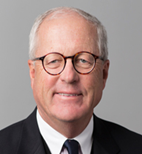October 27, 2015

Directorships: 2
Total director compensation, 2009–2014: $4,837,820
Average annual director compensation: $806,303
Average compensation per full year of service as director: $403,152
James A. Johnson is a prominent Democratic Party member who has made a career out of bridging the gap between the public and private sectors. From 1991 to 1998 Mr. Johnson was CEO of the government sponsored enterprise Fannie Mae, a line on his resume which draws some controversy. Mr. Johnson is a focal point in NY Times columnist Gretchen Morgenson’s book on the build up to the financial crisis (titled Reckless Endangerment). In an interview with NPR, Morgenson described Mr. Johnson as Wall Street’s “founding father of regulation manipulation”. The book claims that Mr. Johnson used his close personal ties to Washington elites to duck regulators while swelling the company’s books with increasingly risky business practices. However, this was before the housing bubble years, so whatever improper practices Johnson may have pursued did not directly contribute to the meltdown and financial crisis.
Mr. Johnson became an influential figure in the Democratic Party as campaign manager for Walter Mondale during Mondale’s 1984 presidential bid against Ronald Reagan. Mr. Johnson also chaired Senator John Kerry’s vice-presidential search committee in 2004. In 2008 he was recruited to head President Obama’s vice-presidential search efforts until controversy over his Fannie Mae years forced him to step down.
In recent years, Mr. Johnson has served on two corporate boards. He has been a member of the Target board of directors since 1996[1], and he joined Goldman Sachs as a director in 1999. He also served as a director at UnitedHealth Group from 1993 to 2008. As a director at these companies Mr. Johnson made $4,837,820 between 2009 and 2014, according to SEC proxy statements for those years. On average Mr. Johnson takes home $806,303 each year in compensation as a director.
As Chair of the Compensation Committees for both Target and Goldman Sachs, Mr. Johnson holds great influence over how much the executives at these two companies are paid. Between 2009 and 2014 the average annual CEO compensation was $19,794,721 for Target and $14,449,872 for Goldman Sachs. During this same period executive compensation increased significantly at the two companies. CEO pay at Target increased by $14.8 million. CEO pay at Goldman Sachs increased by $21.5 million. However, the increase at Goldman Sachs is greatly inflated. In 2009 Goldman Sachs award no stock or other options to its CEO, meaning that the total compensation for the year was only $1 million (base salary plus other compensation). Examining the change in Goldman’s CEO pay from 2010 to 2014 we see a more reliable increase of $8 million.
During this period Goldman Sachs stock largely tracked the S&P 500, rising by 123 percent, compared to 121 percent for the index. Between 2009 and 2014 Target’s stock price substantially outpaced the S&P 500, rising by 177 percent.
[1] Mr. Johnson left Target after the company’s 2015 shareholder meeting having reached the company’s mandatory board retirement age of 72.
Support Cepr
APOYAR A CEPR
If you value CEPR's work, support us by making a financial contribution.
Si valora el trabajo de CEPR, apóyenos haciendo una contribución financiera.

Keep up with our latest news





